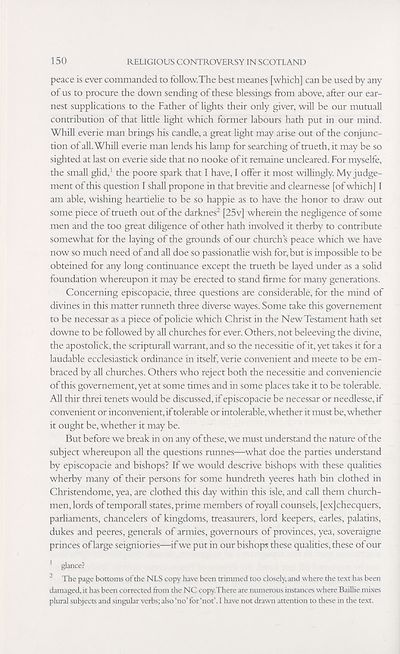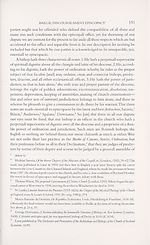Series 5 > Religious Controversy in Scotland 1625-1639
(165) Page 150
Download files
Complete book:
Individual page:
Thumbnail gallery: Grid view | List view

150
RELIGIOUS CONTROVERSY IN SCOTLAND
peace is ever commanded to follow.The best meanes [which] can be used by any
of us to procure the down sending of these blessings from above, after our ear¬
nest supplications to the Father of lights their only giver, will be our mutuall
contribution of that little light which former labours hath put in our mind.
Whill everie man brings his candle, a great light may arise out of the conjunc¬
tion of all. Whill everie man lends his lamp for searching of trueth, it may be so
sighted at last on everie side that no nooke of it remaine uncleared. For myselfe,
the small glid,1 the poore spark that I have, I offer it most willingly. My judge¬
ment of this question I shall propone in that brevitie and clearnesse [of which] I
am able, wishing heartielie to be so happie as to have the honor to draw out
some piece of trueth out of the darknes2 [25v] wherein the negligence of some
men and the too great diHgence of other hath involved it therby to contribute
somewhat for the laying of the grounds of our church’s peace which we have
now so much need of and all doe so passionatlie wish for, but is impossible to be
obteined for any long continuance except the trueth be layed under as a solid
foundation whereupon it may be erected to stand firme for many generations.
Concerning episcopacie, three questions are considerable, for the mind of
divines in this matter runneth three diverse wayes. Some take this governement
to be necessar as a piece ofpolicie which Christ in the New Testament hath set
downe to be followed by all churches for ever. Others, not beleeving the divine,
the apostolick, the scripturall warrant, and so the necessitie of it, yet takes it for a
laudable ecclesiastick ordinance in itself, verie convenient and meete to be em¬
braced by all churches. Others who reject both the necessitie and conveniencie
of this governement, yet at some times and in some places take it to be tolerable.
All thir threi tenets would be discussed, if episcopacie be necessar or needlesse, if
convenient or inconvenient, if tolerable or intolerable, whether it must be, whether
it ought be, whether it may be.
But before we break in on any of these, we must understand the nature of the
subject whereupon all the questions runnes—what doe the parties understand
by episcopacie and bishops? If we would descrive bishops with these qualities
wherby many of their persons for some hundreth yeeres hath bin clothed in
Christendome, yea, are clothed this day within this isle, and call them church¬
men, lords oftemporall states, prime members ofroyall counsels, [ex]checquers,
parHaments, chancelers of kingdoms, treasaurers, lord keepers, earles, palatins,
dukes and peeres, generals of armies, governours of provinces, yea, soveraigne
princes of large seigniories—if we put in our bishops these quahties, these of our
1 gjance?
2 The page bottoms of the NLS copy have been trimmed too closely, and where the text has been
damaged, it has been corrected from the NC copy.There are numerous instances where Baillie mixes
plural subjects and singular verbs; also ‘no’ for ‘not’. I have not drawn attention to these in the text.
RELIGIOUS CONTROVERSY IN SCOTLAND
peace is ever commanded to follow.The best meanes [which] can be used by any
of us to procure the down sending of these blessings from above, after our ear¬
nest supplications to the Father of lights their only giver, will be our mutuall
contribution of that little light which former labours hath put in our mind.
Whill everie man brings his candle, a great light may arise out of the conjunc¬
tion of all. Whill everie man lends his lamp for searching of trueth, it may be so
sighted at last on everie side that no nooke of it remaine uncleared. For myselfe,
the small glid,1 the poore spark that I have, I offer it most willingly. My judge¬
ment of this question I shall propone in that brevitie and clearnesse [of which] I
am able, wishing heartielie to be so happie as to have the honor to draw out
some piece of trueth out of the darknes2 [25v] wherein the negligence of some
men and the too great diHgence of other hath involved it therby to contribute
somewhat for the laying of the grounds of our church’s peace which we have
now so much need of and all doe so passionatlie wish for, but is impossible to be
obteined for any long continuance except the trueth be layed under as a solid
foundation whereupon it may be erected to stand firme for many generations.
Concerning episcopacie, three questions are considerable, for the mind of
divines in this matter runneth three diverse wayes. Some take this governement
to be necessar as a piece ofpolicie which Christ in the New Testament hath set
downe to be followed by all churches for ever. Others, not beleeving the divine,
the apostolick, the scripturall warrant, and so the necessitie of it, yet takes it for a
laudable ecclesiastick ordinance in itself, verie convenient and meete to be em¬
braced by all churches. Others who reject both the necessitie and conveniencie
of this governement, yet at some times and in some places take it to be tolerable.
All thir threi tenets would be discussed, if episcopacie be necessar or needlesse, if
convenient or inconvenient, if tolerable or intolerable, whether it must be, whether
it ought be, whether it may be.
But before we break in on any of these, we must understand the nature of the
subject whereupon all the questions runnes—what doe the parties understand
by episcopacie and bishops? If we would descrive bishops with these qualities
wherby many of their persons for some hundreth yeeres hath bin clothed in
Christendome, yea, are clothed this day within this isle, and call them church¬
men, lords oftemporall states, prime members ofroyall counsels, [ex]checquers,
parHaments, chancelers of kingdoms, treasaurers, lord keepers, earles, palatins,
dukes and peeres, generals of armies, governours of provinces, yea, soveraigne
princes of large seigniories—if we put in our bishops these quahties, these of our
1 gjance?
2 The page bottoms of the NLS copy have been trimmed too closely, and where the text has been
damaged, it has been corrected from the NC copy.There are numerous instances where Baillie mixes
plural subjects and singular verbs; also ‘no’ for ‘not’. I have not drawn attention to these in the text.
Set display mode to:
![]() Universal Viewer |
Universal Viewer | ![]() Mirador |
Large image | Transcription
Mirador |
Large image | Transcription
Images and transcriptions on this page, including medium image downloads, may be used under the Creative Commons Attribution 4.0 International Licence unless otherwise stated. ![]()
| Scottish History Society volumes > Series 5 > Religious Controversy in Scotland 1625-1639 > (165) Page 150 |
|---|
| Permanent URL | https://digital.nls.uk/127329945 |
|---|
| Description | Over 180 volumes, published by the Scottish History Society, containing original sources on Scotland's history and people. With a wide range of subjects, the books collectively cover all periods from the 12th to 20th centuries, and reflect changing trends in Scottish history. Sources are accompanied by scholarly interpretation, references and bibliographies. Volumes are usually published annually, and more digitised volumes will be added as they become available. |
|---|

![[Page 149]Discourse anent Episcopacy](https://deriv.nls.uk/dcn4/1273/2993/127329935.4.jpg)
